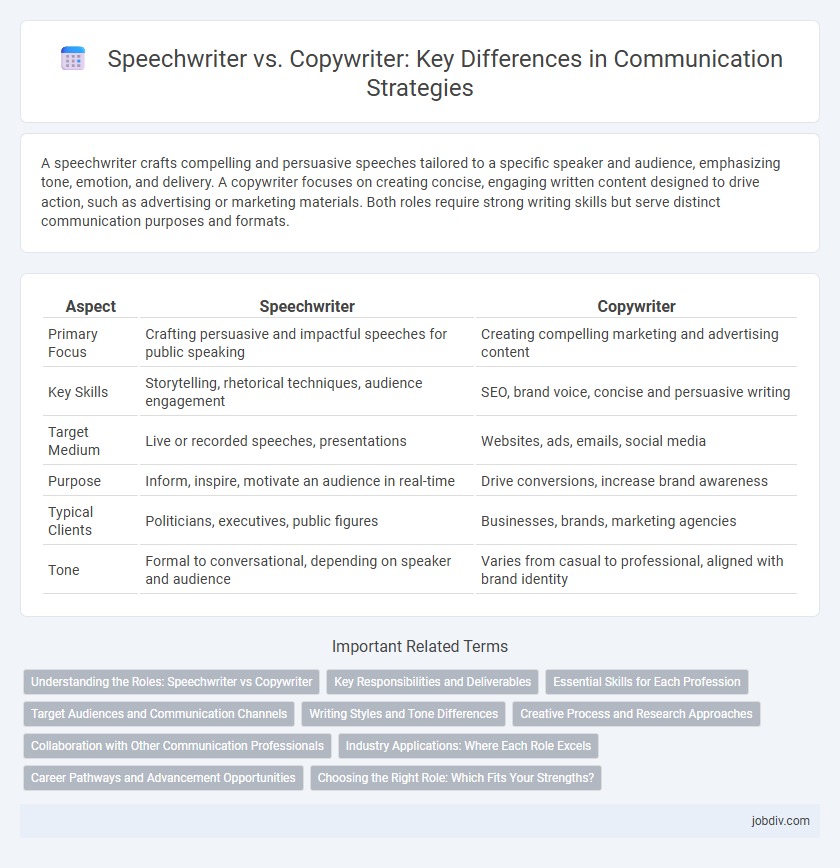A speechwriter crafts compelling and persuasive speeches tailored to a specific speaker and audience, emphasizing tone, emotion, and delivery. A copywriter focuses on creating concise, engaging written content designed to drive action, such as advertising or marketing materials. Both roles require strong writing skills but serve distinct communication purposes and formats.
Table of Comparison
| Aspect | Speechwriter | Copywriter |
|---|---|---|
| Primary Focus | Crafting persuasive and impactful speeches for public speaking | Creating compelling marketing and advertising content |
| Key Skills | Storytelling, rhetorical techniques, audience engagement | SEO, brand voice, concise and persuasive writing |
| Target Medium | Live or recorded speeches, presentations | Websites, ads, emails, social media |
| Purpose | Inform, inspire, motivate an audience in real-time | Drive conversions, increase brand awareness |
| Typical Clients | Politicians, executives, public figures | Businesses, brands, marketing agencies |
| Tone | Formal to conversational, depending on speaker and audience | Varies from casual to professional, aligned with brand identity |
Understanding the Roles: Speechwriter vs Copywriter
A speechwriter crafts spoken content tailored to the speaker's voice and audience, aiming to inspire, inform, or persuade during live presentations. A copywriter creates written material designed primarily for marketing, advertising, or digital content, focusing on engaging and converting readers. Understanding these distinct roles highlights how speechwriters prioritize oral delivery and tone, while copywriters emphasize SEO, branding, and call-to-action effectiveness.
Key Responsibilities and Deliverables
Speechwriters craft tailored speeches that align with the speaker's voice and objectives, focusing on persuasive and engaging narratives designed for live delivery and audience impact. Copywriters create compelling written content for marketing materials, websites, and advertisements, emphasizing brand messaging, SEO optimization, and conversion goals. Speechwriters deliver polished scripts ready for presentation, while copywriters produce versatile text assets aimed at driving customer engagement and sales.
Essential Skills for Each Profession
Speechwriters excel in persuasive narrative crafting, deep audience insight, and mastering tone to evoke emotion and drive action in spoken communication. Copywriters specialize in concise, compelling language tailored for digital and print media, SEO proficiency, and adaptability across various brand voices to boost engagement and conversions. Both professions demand strong research, creativity, and an understanding of target demographics to effectively deliver messages aligned with strategic goals.
Target Audiences and Communication Channels
Speechwriters tailor messages for live audiences such as executives, politicians, or event attendees, focusing on verbal impact and engagement through speeches delivered in person or via broadcast media. Copywriters create persuasive written content for diverse platforms including websites, social media, email campaigns, and print ads, targeting consumers or specific market segments with concise, actionable language. Understanding the target audience's preferences and the communication channel is crucial for both roles to maximize message effectiveness and audience connection.
Writing Styles and Tone Differences
Speechwriters craft persuasive, conversational, and emotive scripts tailored for live delivery, emphasizing clarity, rhythm, and audience engagement, often incorporating rhetorical devices and pauses for impact. Copywriters focus on concise, compelling, and action-driven content optimized for digital platforms, prioritizing SEO keywords, brand voice consistency, and clear calls-to-action. The tone in speechwriting often mirrors the speaker's personality to foster connection, while copywriting tone aligns strictly with marketing objectives to drive sales or conversions.
Creative Process and Research Approaches
Speechwriters immerse themselves in the speaker's voice and audience dynamics, using in-depth persona analysis and contextual research to craft impactful, persuasive narratives tailored for live delivery. Copywriters focus on market trends and consumer behavior, leveraging keyword research and A/B testing data to create concise, compelling content optimized for digital engagement and conversion. Both roles require extensive research, but speechwriters prioritize emotional resonance and rhetorical devices, while copywriters emphasize SEO strategies and brand messaging consistency.
Collaboration with Other Communication Professionals
Speechwriters and copywriters collaborate closely with public relations specialists, marketing teams, and brand strategists to ensure message consistency and audience engagement across platforms. Speechwriters tailor content for live or recorded presentations that require emotional resonance and persuasive rhetoric, while copywriters craft concise, impactful text for advertising, websites, and social media. Their joint efforts enhance communication campaigns by combining narrative storytelling with strategic brand messaging to achieve organizational goals.
Industry Applications: Where Each Role Excels
Speechwriters excel in political, corporate leadership, and public speaking contexts where tailored, persuasive spoken communication is critical to influence audiences and convey complex ideas. Copywriters thrive in advertising, digital marketing, and brand storytelling where concise, engaging written content drives sales, customer engagement, and online visibility. Both roles require strong writing skills, but speechwriters focus on oratory impact while copywriters emphasize conversion and brand voice consistency.
Career Pathways and Advancement Opportunities
Speechwriters often advance by gaining expertise in political strategy, public relations, and executive communication, leading to senior advisory or communications director roles. Copywriters typically progress through experience in advertising, digital marketing, and brand management, moving toward creative director or content strategist positions. Both careers offer diverse pathways, but speechwriters focus more on tailored, impactful messaging for live audiences, while copywriters emphasize persuasive, broad-reaching advertising content.
Choosing the Right Role: Which Fits Your Strengths?
Speechwriters specialize in crafting compelling narratives tailored for spoken delivery, emphasizing tone, cadence, and audience engagement to ensure messages resonate during live presentations. Copywriters focus on concise, persuasive written content designed to drive actions such as sales or clicks across digital and print media. Choosing the right role depends on your strengths in verbal storytelling and public influence versus creating impactful, succinct text optimized for marketing and conversion.
Speechwriter vs Copywriter Infographic

 jobdiv.com
jobdiv.com